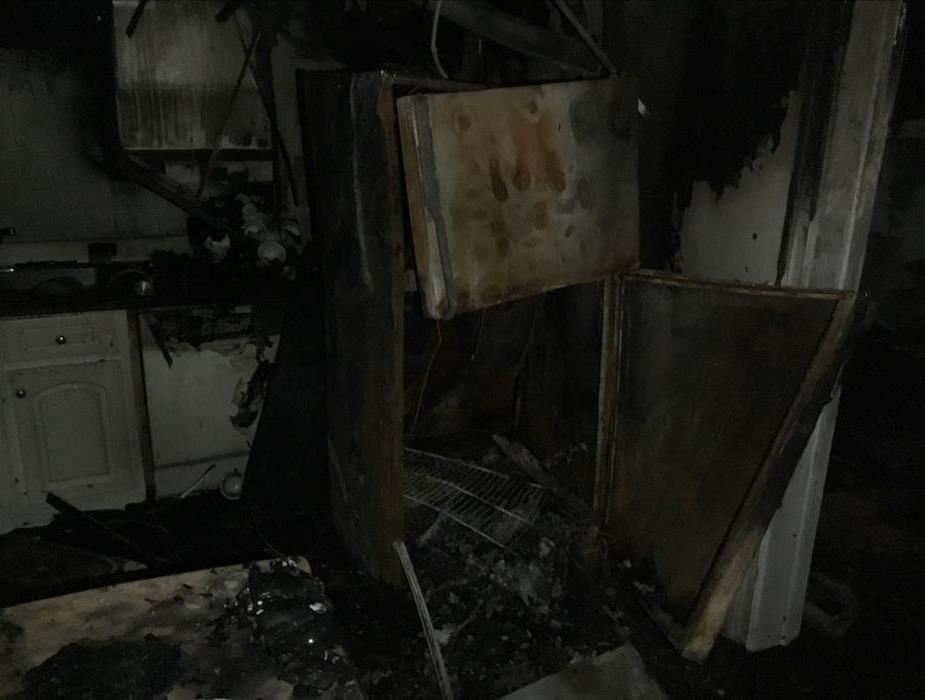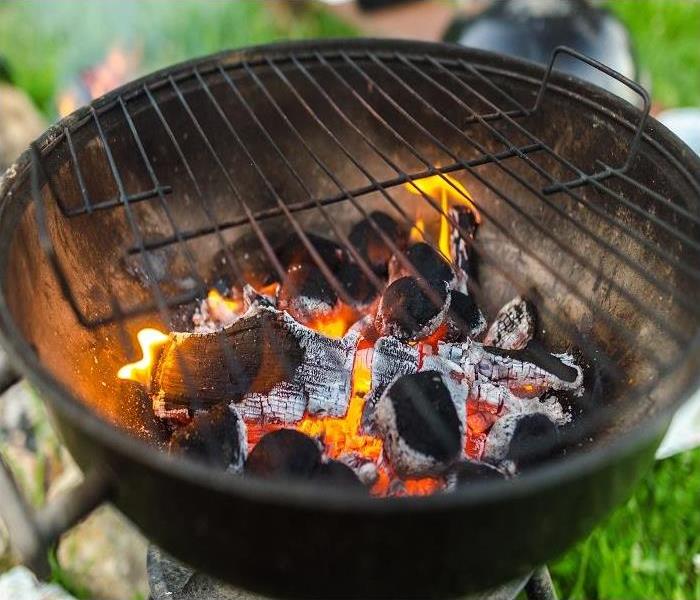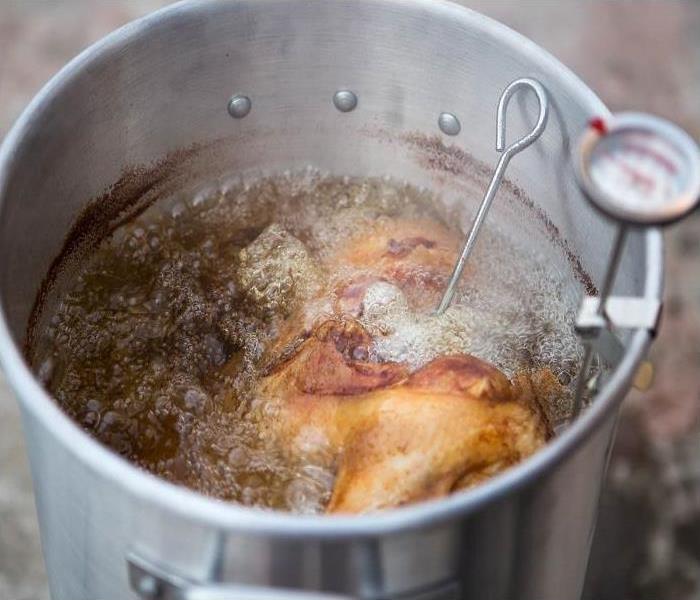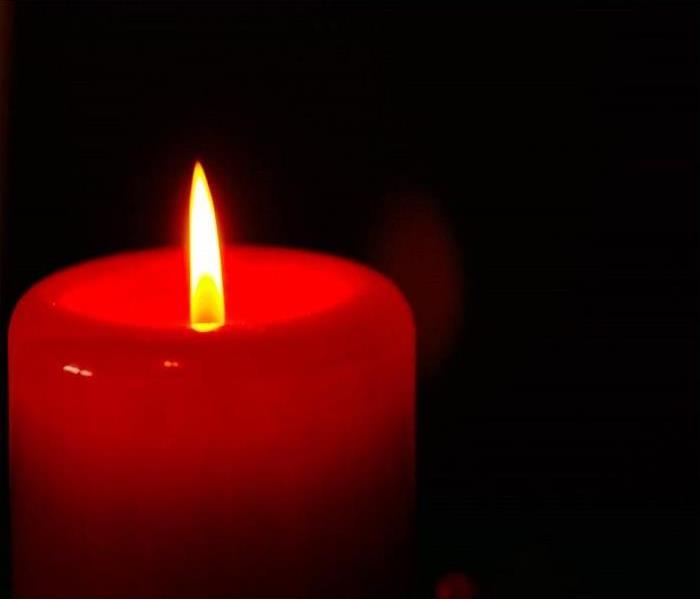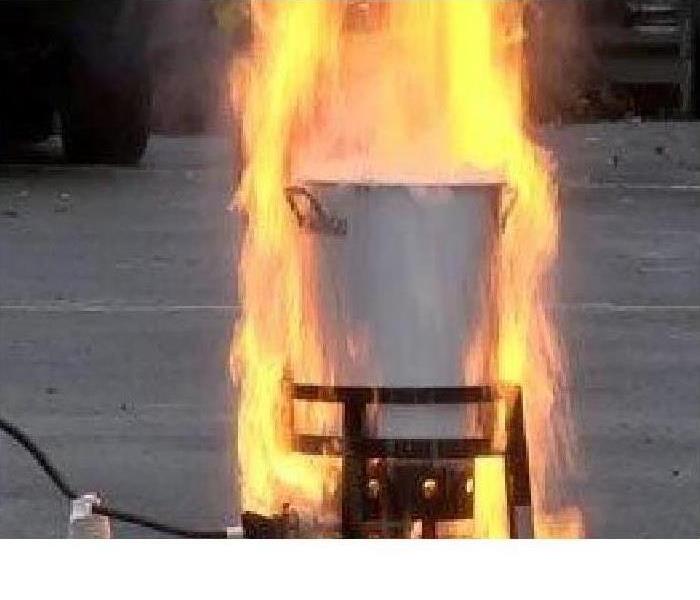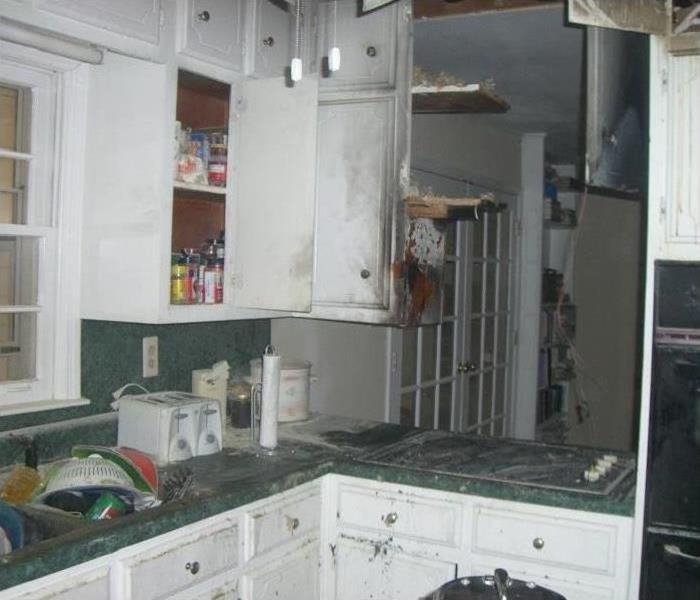Recent Fire Damage Posts
SERVPRO's Process for Fire Restoration
8/10/2022 (Permalink)
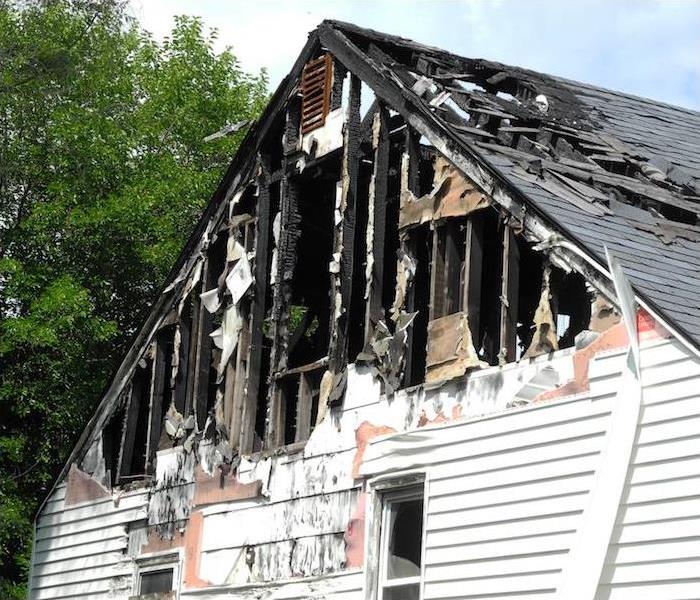 When your home or business endures fire damage, you can count on SERVPRO of Stone Mountain/Clarkston from start to finish.
When your home or business endures fire damage, you can count on SERVPRO of Stone Mountain/Clarkston from start to finish.
After a fire strikes your home or business, you’re left with damage from the fire as well as water saturating everything from the firefighting efforts. None of that would be a surprise to our experts here at SERVPRO, as we have the specialized fire restoration expertise to return your house to its pre-fire state.
Every fire damage situation is unique and necessitates a unique remedy, but the overall procedure remains the same. The following is how we will handle a “normal” fire damage situation.
Initial contact. We are on call 24 hours a day and seven days a week, including all holidays. Disaster doesn’t wait for office hours to strike, and we don’t wait to respond. When you contact us, the restoration procedure starts. Our experts will ask a number of questions about the fire damage so that we can get started immediately with the necessary equipment and resources.
Inspection. To establish the degree of the fire, water, smoke and soot damage, we will thoroughly check and test every room. By doing this, we are able to formulate the proper strategy. Fires can cause the air quality to be unsafe, so it’s important not to re-enter the property until experts have determined it is safe to do so.
Water removal. If there is water damage present as a result of firefighting efforts or sprinkler systems, we will begin the water removal procedure immediately to ensure the bulk of the water is removed. If there is any remaining water, it will be removed using dehumidifiers and fans, and the drying process will begin from there.
Cleaning. SERVPRO removes smoke and soot from ceilings, walls and other surfaces using highly specialized state-of-the-art equipment and processes. We’ll clean up all of the fire-damaged items and areas that can be cleaned and repaired. We will also work to return your possessions to their pre-fire state by applying a number of cleaning processes. We can clean and restore electronics, documents, upholstery and more. We also specialize in industrial air scrubbers and fogging equipment to eliminate odors.
Restoration. If during the cleaning process we determine that certain areas of your property cannot be cleaned, we also provide comprehensive restoration and rebuilding services. Restoration and rebuilding efforts include everything from modest repairs like drywall replacement, painting or carpet installation to substantial repairs like the complete rebuilding of different areas or rooms in your home or property.
When your home or business endures fire damage, you can trust that SERVPRO of Stone Mountain/Clarkston will be ready to be a helping hand and will get your home restored quickly and thoroughly to its pre-fire condition.
The Fire Tetrahedron (or How to Stop a Fire 4 Different Ways) | SERVPRO® of Gwinnett County South
1/25/2022 (Permalink)
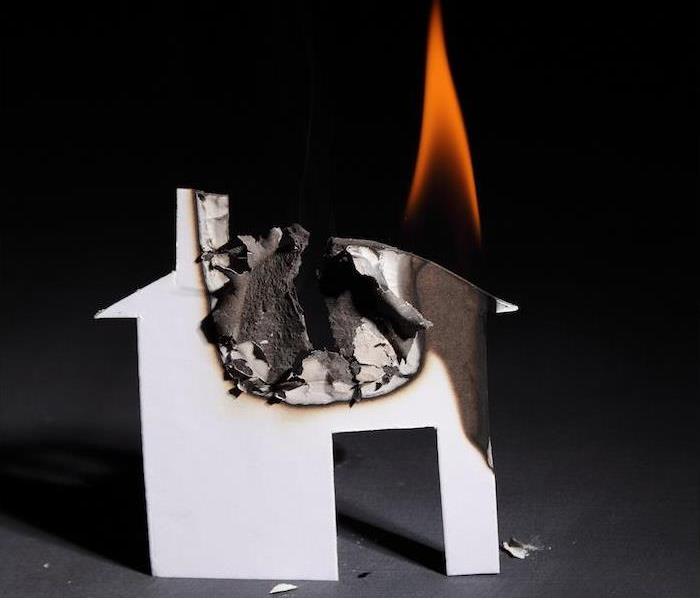 If your home or business has any damage, SERVPRO of Gwinnett County South is ready around the clock to help you recover.
If your home or business has any damage, SERVPRO of Gwinnett County South is ready around the clock to help you recover.
Don’t call it a pyramid, and don’t mistake it for a prism. A tetrahedron is all triangles—four of them, in fact, connected three-dimensionally, as opposed to a pyramid, which has a square base and five sides, or a prism, which has two triangular ends with three rectangular sides connecting them.
Got all that? Good. Let’s get into today’s geometry…er, fire safety lesson.
The geometry comes into play here: The fire tetrahedron represents the four equal components of a fire, each depending on the other for a fire’s outset and survival.
They work in sync and in cycle to make a fire start and keep it alive, and they offer important insight into how we make living fires stop. Let’s look at each side and how it plays into fire management.
The 4 Things a Fire Needs to LiveFuel. Fire has to burn something, right? That something is what we call the fire’s fuel source. Whether it’s a grove of trees in a wildfire or the grease in your frying pan, something has to be available for a fire to consume.
Heat. The material that becomes the fuel source also has to reach a certain level of heat before it can burst into flame. The specific degree marker varies, but every material has its flash point.
Oxygen. That oxygen we all breathe is essential for our survival, and the same goes for fire. Fires can’t start in a vacuum—they require a steady, available influx of oxygen to get going and stay alive.
Chemical Chain Reaction. The previous three components all react together, repeatedly, in a chain reaction that self-perpetuates until one of the elements is removed, depleted or disrupted.
And that only happens in one of the following ways.
The 4 Ways to Stop a FireCool it. Fire is hot, so this is naturally the first reaction to a fire. It’s also an effective one. Restoring the thermal balance to the fire’s fuel—for example, cooling the wood frame of a house fire with water from a firehose until the rate of cooling overtakes the rate of heating—brings a fire to a quick halt.
Smother it. When you stamp out a fire, or even when you snuff out a cigarette, this is the reason it works. Cutting off a fire’s oxygen supply by smothering it stops the fire’s ability to consume what it needs to stay alive.
Starve it. If the other three components are in place, a fire would burn forever, provided it always had fuel. So one of the ways to end a fire is to either remove that fuel from its path or create a situation in which it burns all the available fuel and has nowhere left to go.
Interrupt the chain reaction. The science here is a little advanced, but the gist is that certain chemicals and gases can disrupt the cycle that must be present for fire to survive. Halon was thought to be the be-all-end-all solution of this kind until its adverse impact on the environment was discovered.
If the fire tetrahedron makes a wreck of your home or business, we’re ready around the clock to help you recover. Contact SERVPRO anytime for fast, thorough cleanup and recovery after a fire.�
We’re on Call so We Can Be Onsite Fast | SERVPRO® of Gwinnett County South
12/17/2021 (Permalink)
If you are old enough to recall rotary phones and 8-tracks, you remember an era when there was much more waiting involved in everyday life. It may have been a slower-paced life, but it sure was a lot more boring, wasn’t it?
If you wanted clothes, you had to physically drive to a mall somewhere and browse (on your actual feet) until you found what you wanted. Now you can get what you need in a few simple clicks, and fill your life with other activities until it arrives, depending on your site, as soon as a few hours later. Hope you can stand the anticipation.
It’s true that we live in a day in which waiting for many things has been almost totally eliminated, and in the case of home restoration, that’s a very good thing, both for your home and for your bottom line.
SERVPRO is here for you 24 hours a day, because there’s no time to wait when your home is suddenly damaged by water, fire or some other disaster.
After a fire. Fires act quickly, bringing massive destruction to your home or business. But quickly after the fire settles, you’ve got another problem even in areas left standing. Soot, the tiny, black micro-particles left after combustion in a fire goes unfinished, creates a thick, black curtain that covers walls, floors and other surfaces. And in a matter of minutes, soot goes to work attaching itself to all those surfaces, making stains that are near-impossible to remove.
Soot and smoke need only a few hours to set in irreparably in your home. So when you have a fire, there’s literally no time to wait for restoration to begin—every wasted moment means either more stains and smell, or more reconstruction necessary to get rid of them.
After water damage. Mold doesn’t wait and neither should you. You have only 48 hours after a water damage incident to get your home completely dried and dehumidified before mold growth begins, creating opportunity for health hazards, structural risks and more.
All this to say nothing of urgent situations brought on by weather events, natural disasters, sudden roof damage and the like. The bottom line is you shouldn’t wait, and you don’t have to.
Take advantage of SERVPRO 24-hour emergency service. It’s one more reason we’re Faster to Any Size Disaster.
When you need help after a home or business disaster, fast service is a priority, and there’s nobody faster or more prepared than SERVPRO. Call us anytime to take advantage of our 24-hour emergency service.
The Most Frequent Causes of Fire in the Home | SERVPRO® of Gwinnett County South
11/3/2021 (Permalink)
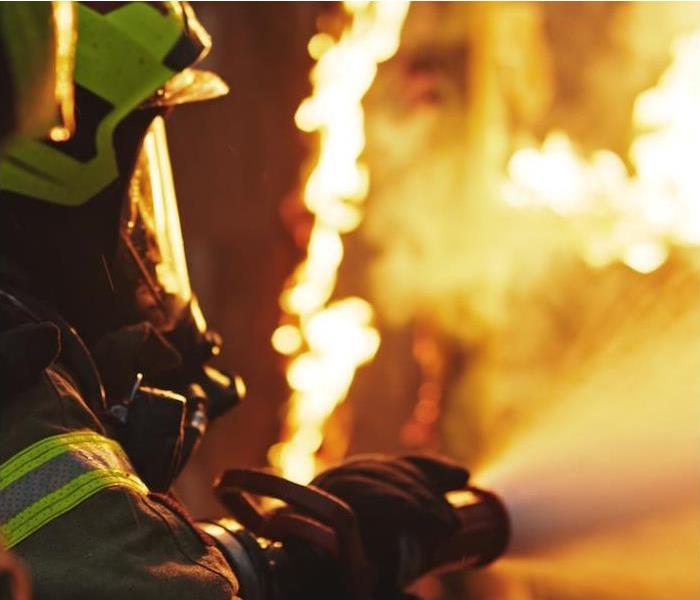 Regardless of the cause, SERVPRO of Gwinnett County South is here for you if your home is affected by fire.
Regardless of the cause, SERVPRO of Gwinnett County South is here for you if your home is affected by fire.
Fire safety is incredibly important, and we would surely all say that we know it. But to what degree are we living out the knowledge we have?
Studies show we still have a long way to go; in fact, a quarter of all reported fires in the United States are still occurring in the home, despite all that we know about the importance of prevention.
Some of these fires can’t be prevented, but many can. Let’s see what’s going on to get these fires going.
Cooking. Essentially half of all home fires start in the kitchen. These fires have varying causes, but the leading (and yet most preventable) cause is unattended cooking. That’s right, the single most effective thing you can do to prevent a fire in your house is to be attentive when you cook. Stand with your food; that’s really it.
Heating equipment. All heat and combustion invites the risk of fire, but some heaters are more dangerous than others. Portable heaters, especially older ones, present a great hazard, both because of power draw and their tendency to overload or get tipped over. Always remember to keep a three-foot radius around any heat source to avoid potential ignition.
Electrical fires. Electrical fires can spark to life from overloaded or shorted circuits, mismanaged use of power or improper use of extension cords. What’s more, circuits and outlets can degrade over time, and wiring can even be chewed by animals.
Intentional fires. This one is a little hard to swallow, but the research bears it out: Some 8%, or approximately 28,000 home fires per year are started on purpose, meaning somebody intentionally misuses heating elements to set fire to some piece of property.
Smoking materials. This one is both interesting and sad. Though smoking fires comprise only 5% of the total number of home fires, they cause almost a quarter of all home fire deaths. Cigarettes, ash and other materials are always hazardous, especially when people use them while drowsy or otherwise impaired.
Regardless of the cause, SERVPRO is here for you if your home is affected by fire. Contact your local team today to see how we can help.
Why You Need Deodorization After a Fire
10/15/2021 (Permalink)
Smoke and Fire Deodorization
Strong smells often linger after having a fire. The type of smells that develop are determined by the type of material that was on fire or smoldering. A hot fire that burned natural building materials will smell different than that of a protein fire from frying or a slow smoldering fire that burned plastics and rubber. These odors can cause years of problems if they are not handled by a professional. At SERVPRO of Stone Mountain/Clarkston we employ a multi-step approach to deodorization.
Source Removal
The first step in deodorization is to find the source. In the case of a fire the area may be obvious, however there are many causes of odor that may not be easily noticed. Once the source is found by our trained technicians we must remove it.
Cleaning
The next step in the process is to clean the effected areas. Many of the soot particles are deposited both on and often inside certain building materials depending on how hot the fire was. Our technicians are trained on different cleaning strategies dependent on the surface to be cleaned and the soils deposited.
Deodorizing
We employ a combination of pairing and masking deodorization techniques depending on the situation. Hot fires open the pores of building materials where foul smelling soot can be deposited. When the fire is extinguished and the materials cool down, the pores of these material shrink, thus trapping odor molecules inside. In such cases we will use a pairing agent along with a Hot Thermal Fogger to reopen the pores. The pairing agent will attach to and change the odor molecule so that it no longer smells.
Sealing
While sealing of wood is not always required, we will often do this on studs and structural members. One of the reasons for sealing is because these building components are often covered up by drywall, or they are located in hard to reach areas. Summer brings hot weather and as building materials heat up, these materials are capable of releasing odors. Sealing ensures that any soot not completely eliminated from cleaning remains trapped.
Keep Autumn Fire Safety in Mind | SERVPRO® of Gwinnett County South
9/17/2021 (Permalink)
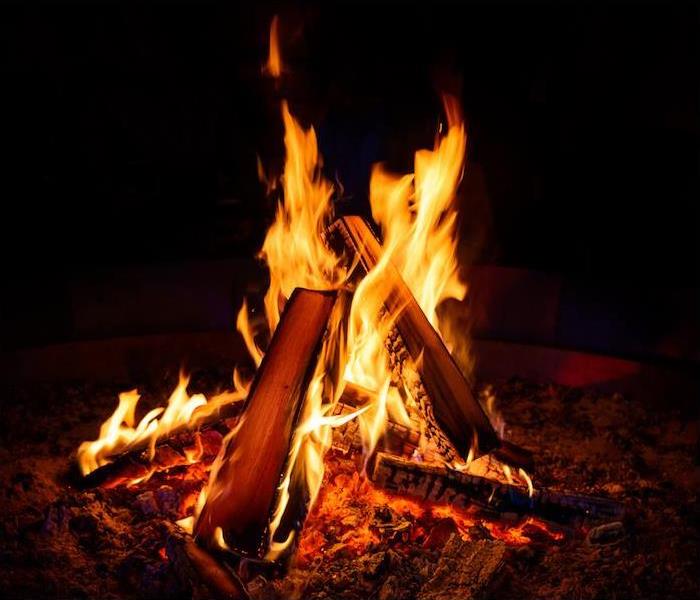 Be mindful about fall fire safety. Always remember that SERVPRO of Gwinnett County South is the trusted leader in the restoration industry.
Be mindful about fall fire safety. Always remember that SERVPRO of Gwinnett County South is the trusted leader in the restoration industry.
Y’all feel it? The sweltering summer heat and dripping-wet humidity are finally backing off, leaves are showing their colors, and there are football games popping up everywhere.
Yes, everything is in place for the triumphant return of fall. Final warm-day plans are in place, and orange and brown decorations are going up everywhere.
As you welcome in the mild, crisp autumn air, let fire safety for the new season be part of your plans as well.
Campfire Safety
Fall may be the best time of year for camping. You’ll likely start a fire for nighttime warmth or roasting s’mores, but be sure that you both build and extinguish it safely.
Make sure any structures, tents or vehicles are at least 25 feet away. Only light your kindling with a normal lighter or matches; never employ the use of kerosene or lighter fluid to start or accelerate your fire. Then you can safely build the rest of your fire.
Never leave your fire to burn by itself while you’re out hiking, and extinguish it completely before you break camp by dousing it repeatedly until there are no embers remaining.
Leaf Burning
By now, your front yard is likely covered with dead leaves, and you want those gone for the sake of your grass. You have a few options—have them hauled away, mulch or compost them, or burn them.
If you opt to burn your trimmings and leaves, be sure you first acquire a permit from Georgia Forestry, and alert your local fire station that you’ll be burning.
Also, be aware that it’s illegal and hazardous to burn anything like household garbage, or anything inorganic.
If you have a metal barrel in which to burn your leaves, that’s best. And make sure your fire is safely away (50 feet or more) from your home or any flammable structures.
Halloween
We’ll likely get into more detail on this later, but as you decorate, keep fire safety in mind.
Hanging decorations and cobwebs during the season of pumpkin-scented candles and bonfires can be more dangerous than you realize, especially if you’re hosting spooky-season parties with adult beverages involved.
If a fire hazard should turn from potential to reality in your home, remember the trusted leader in the recovery industry and contact SERVPRO to get your property fully restored right down to the smell of smoke.
Your Yard Can Protect Your House From Wildfire | SERVPRO® of Gwinnett County South
7/27/2021 (Permalink)
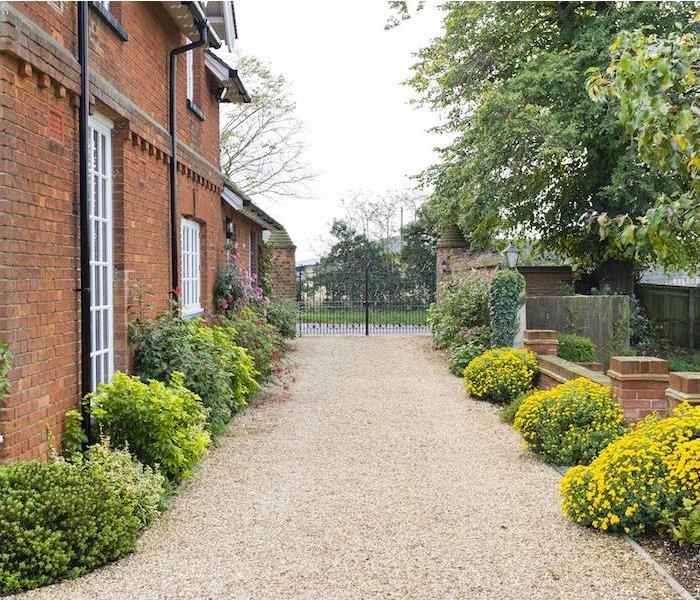 If your home is damaged by fire or any other reason, SERVPRO of Gwinnett County South is ready and able to repair any damage.
If your home is damaged by fire or any other reason, SERVPRO of Gwinnett County South is ready and able to repair any damage.
Wildfire is a homeowner’s fever dream—the helplessness of watching your home go up against a raging fire. Thankfully you live in Georgia, where that kind of stuff doesn’t happen, right?
Actually, property damage caused by wildfire is a more common occurrence than you may realize. Wildfires happen all over—and with their rate of acceleration and the abundance of fuel for them to devour, it’s a wonder we are ever able to stop them at all.
But we are not totally helpless; there are a few things we can do, other than simply being more careful, to stop the spread of wildfires.
Today we’re learning about “defensible space.”
What Is Defensible Space?
See, NASA has these missiles—no, wait, that’s not it; let’s try again. “Defensible space” is a buffer area with which you can surround your home.
By removing potential fuel like dead trees and leaves, adding hardscape and gravel to the immediate areas around your home, and using purposeful planting and pruning practices, you can decrease the odds that your home will be swallowed up.
Think of defensible space as a protective barrier (aka defense), designed to choke out a fire’s fuel sources as it comes near to your home. Additionally, it gives firefighters their best chance of stopping a wildfire before it breaks through your home’s perimeter.
Defensible space is not required by law in Georgia, but it’s a good fire safety practice to consider all the same.
Why Defensible Space Matters
You may think of wildfires as a California problem, but they can and do happen everywhere in the United States. There were over 59,000 wildfires across the United States in 2020.
Even if you remove California’s astounding 10,000+ fires from that number, the average number of wildfires per state in 2020 was still almost 1,000. And it’s not over—the first six months of 2021 have seen a 25% increase in wildfire occurrence over last year.
Here in Georgia we suffered 1,699 wildfires in 2020, losing nearly 5,700 acres of land to the blazes.
We should take advantage of anything that makes wildfires less likely to impact our homes. Defensible space is just one more way we can protect our property.
If your home is damaged by fire of any sort, wild or not, SERVPRO is ready and able to repair the damage caused. Get in touch today to get the pros on your team.
Fireworks during Summer Holidays
7/2/2021 (Permalink)
Fireworks are a great way to help celebrate the summer holidays. Keep these safety tips in mind before lighting up your celebration. Remember fireworks injure 10,000 people per year, so keep your family safe.
- Always have adult supervision
- Keep fireworks away from children. Sparklers can burn up to 1200 degrees
- Always wear eye protection
- Never light fireworks indoor or near grassy areas
- Obey local laws regarding fireworks
- Alcohol and fireworks do not mix
- Follow label instructions
- Never point or throw fireworks at another person
- Always have an bucket or water or hose near by
- Never carry fireworks in your pocket
- Never shoot fireworks in metal or glass containers
- Light one firework at a time
- Never attempt to re-light a firework
- Never have any portion of your body over the firework
- Don’t experiment with homemade fireworks
- Buy only fireworks from a legal source
- Keep your pets indoors and away from fireworks
Unfortunately, accidents happen. In case of fire or water damage call SERVPRO of Gwinnett County SE & SW at 770-448-5782. We are available 24/7 to help!
Grill Safely This Spring & Summer | SERVPRO® of Gwinnett County South
6/22/2021 (Permalink)
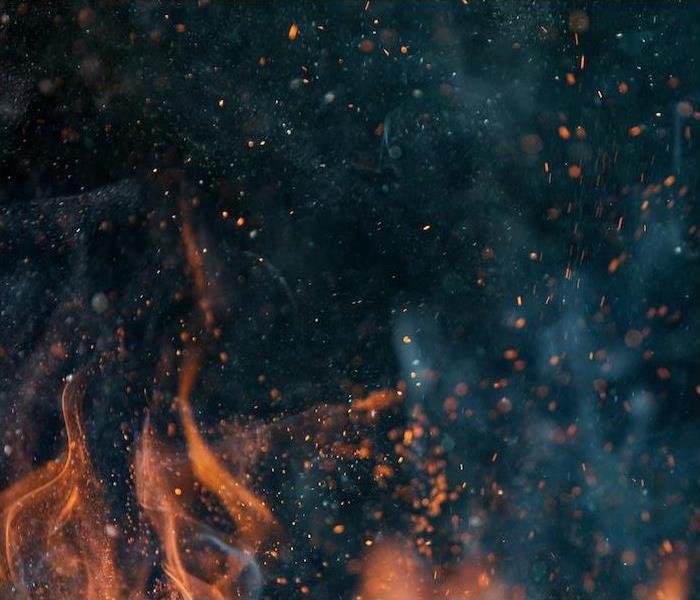 Restoring fire and smoke damage is one of our specialties. Contact SERVPRO of Gwinnett County South to learn more.
Restoring fire and smoke damage is one of our specialties. Contact SERVPRO of Gwinnett County South to learn more.
Spring gives us a fresh invitation to life. Cold weather is behind us, days are growing long and the weather is mild.
Kids are anticipating school’s end, vacations are being planned and we’re all itching for some outdoor activity before summer swelters take over.
Spring also begs us to break out the grill and get cooking. Whether it’s a cookout or a reunion, a gender reveal or a graduation celebration, we’ll find nearly any excuse to grill some chicken wings, burgers or steaks.
But this increase in outdoor activity also portends a rise in accidental fires. In fact, spring sees more daily fires on average than any other time of year. So before you get fully into your backyard activities, let’s look at a few causes of backyard blazes you can take care of this season.
The grill. The combination of flame, heat, grease and gas makes grills a prime suspect for backyard fires, and rightfully so. Here’s a quick checklist for safe grilling: Make sure the grill is in good working order, with no leaks or rust holes, and keep it away from anything flammable (including the house). And don’t forget how important it is to keep your grill and its components clean. Almost 20% of grill fires are due to poor cleaning.
The fire pit. Conversations and marshmallows abound around the fire pit, and everyone loves to spend a cool evening at the social center of the backyard. But make sure you’re operating it safely; you’re literally hosting an open fire. Use a grill grate, and avoid adding leaves or pine needles to the fire, as they create embers that are easily carried by a gust of wind into the yard or toward the house. And use a bucket of water as a safety measure, allowing you to douse any errant flames and safely, slowly, extinguish the fire when the night is over. Make sure everything is cool to the touch before you go.
Chimneys and dryer vents. While fire safety is on your mind, clean the ash and soot from your chimney to avoid flammable situations in the fall, and check your dryer’s vent pipe to make sure there’s not built-up lint in there waiting to be ignited.
Your local SERVPRO technicians are on hand 24⁄7 for emergencies. If you encounter fire damage at your home or business, no matter the cause, we will be there faster and have it cleaned up sooner. Call or click today and experience the SERVPRO difference.
House Fire? What to do?
6/10/2021 (Permalink)
- Ask whether it is safe to enter the home. Do not enter if the fire authorities deem it unsafe. They may establish a safety zone, but never assume a room is safe, until it has been cleared to enter.
- Know who to call.
- Contact family members and let them know you are safe and unharmed.
- Contact your insurance agent. They will be able to talk you through the necessary steps, including proper documentation and emergency lodging and living expenses (keep all of your receipts!) The insurance company may assist in securing a company to help with clean up options.
- You may request a fire mitigation company at this time for contents cleaning, structure cleaning, restoration etc. Contact SERVPRO® of Gwinnett County at 770-448-5782
- Secure the property to prevent possible looting. SERVPRO® of Gwinnett County SE & SW is available to assist with securing property/ Board Ups.
- If water hoses were used to exterminate the fire, drying your home is critical. It is best to call the professionals at SERVPRO® of Gwinnett County SE & SW to do water/ fire cleanups. Water can lead to mold damage if not dried properly. Our company is an approved restoration contractor for many major insurance carriers and adheres to the highest standards in the restoration industry.
- Seek counseling if needed. Children and adults can feel a traumatic sense of loss and may need help to avoid a lasting sense of sadness and disorientation after a house fire. Don’t be afraid to reach out for help. A house fire is a traumatic event and individuals need to be treated with respect and compassion by those close to the process of rebuilding.
Ask Yourself These Fire Safety Questions This Winter | SERVPRO® of Gwinnett County
1/26/2021 (Permalink)
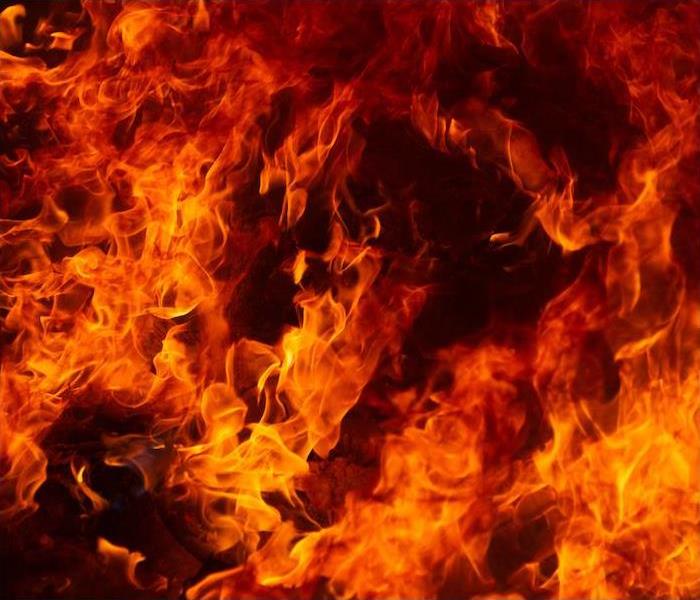 House fires tend to peak during the winter. SERVPRO of Gwinnett County South are available 24/7 in the event of an emergency.
House fires tend to peak during the winter. SERVPRO of Gwinnett County South are available 24/7 in the event of an emergency.
Household fires are a common winter threat, and they’re most common in December and January.
If you’re like most homeowners, you may wonder what you can do to make your home a safer place and prevent these types of fires. Your local SERVPRO team is here to help you understand what you can do to lower your fire risk.
How Would You Answer These Fire Safety Questions?
One of the first steps to making your home safer is understanding what steps you should take to do it. Your answers to these questions are an excellent place to start:
Do you know the basics of kitchen safety? Grease fires can happen in any kitchen, and they’re a common hazard. Keeping a fire extinguisher accessible while you’re cooking can prevent one of these incidents from growing into a destructive fire.
Can you use your fireplace safely? Fireplaces that are dirty or clogged create a fire hazard. If you do decide to enjoy a crackling fire, be sure you’re disposing of the ashes correctly.
Do you know how to find natural gas leaks? Natural gas leaks are usually first noticeable by smell. If you notice the smell of natural gas in your home, act immediately to cut off your gas and get help to your home. Natural gas leaks are a significant fire hazard.
Do you practice good candle safety? Burning candles can create a nice ambiance in your home. But they can also be a fire hazard if you’re not careful. Don’t leave candles burning when you aren’t home. And, if you find that you’re forgetful when you leave them burning, then consider buying battery-operated candles for a similar effect.
So, what’s the good news? Regardless of how you answered these questions, you can move forward from today knowing what you need to do, and you can make most of these changes by switching up your habits and being more aware of what’s going on in your home. It won’t take a considerable investment of time or money.
If your home is damaged due to a fire or any other cause, you can always count on us for restoration assistance. We have crews who are available 24⁄7 in the event of an emergency. Contact us at any time to learn more about our restoration services and how we can help your family.
Gwinnett County Experts Are Here to Help You With Fire Damage l SERVPRO® of Gwinnett County South
12/28/2020 (Permalink)
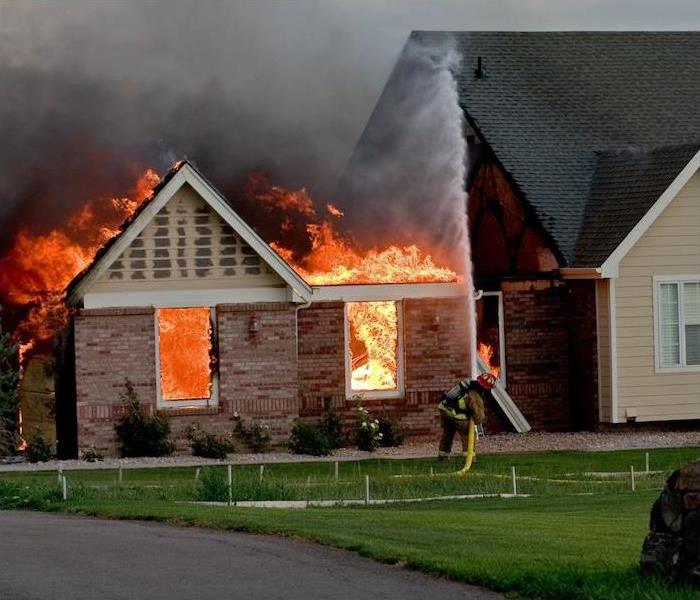 If you have fire damage due to a heating malfunction or other issue, count on SERVPRO of Gwinnett County South to fully restore your home.
If you have fire damage due to a heating malfunction or other issue, count on SERVPRO of Gwinnett County South to fully restore your home.
No one wants to think about what happens after a house fire. But that situation will become a reality for millions of homeowners over the next year, including in our community. If you are dealing with the aftermath of a house fire, our team wants to help you restore your home.
Here’s why people who live here see us as a trusted partner for fire damage remediation and restoration:
We restore things before you replace them. Our team works with you to remediate the damage in a logical, economical way. Our goal is to guide you through the process economically and logically, saving you money on your repairs and your insurance premiums. We’ll make it "Like it never even happened," at all.
We can help with the whole process. Did you know fires can cause water damage? They also cause smoke damage to your home’s walls, upholstery, furniture and curtains. We have the skills and equipment needed to repair these problems.
We’re locally owned and operated. SERVPRO is a national company. But our business is located in Gwinnett County and owned by a resident. That means our teams have access to the resources and training of a growing national company. We bring the advantages of that partnership to the jobs we do in the community.
We’re available to help 24⁄7. Fires don’t always happen during regular working hours. Beginning the restoration process is a vital step in restoring your home to its original state. Timing matters during an emergency, so our team is available at any time when you need help.
Winter Fire Hazards
Fires aren’t a seasonal safety risk, but they are more likely to occur during the winter. This season presents unique fire risks, including everything from toppled space heaters to accidents involving kids and candles.
Fires involving Christmas trees are common. But malfunctioning furnaces and mishaps with the kitchen stove are common winter fire culprits, too.
If you have fire damage in your home due to a kitchen, heating or other fire, you can count on us for restoration assistance. Our team is always ready to meet your needs and help you restore your home. Contact us at any time to learn more about our restoration services.
Keep Fires out of Your Holiday Celebrations | SERVPRO® of Gwinnett County South
11/10/2020 (Permalink)
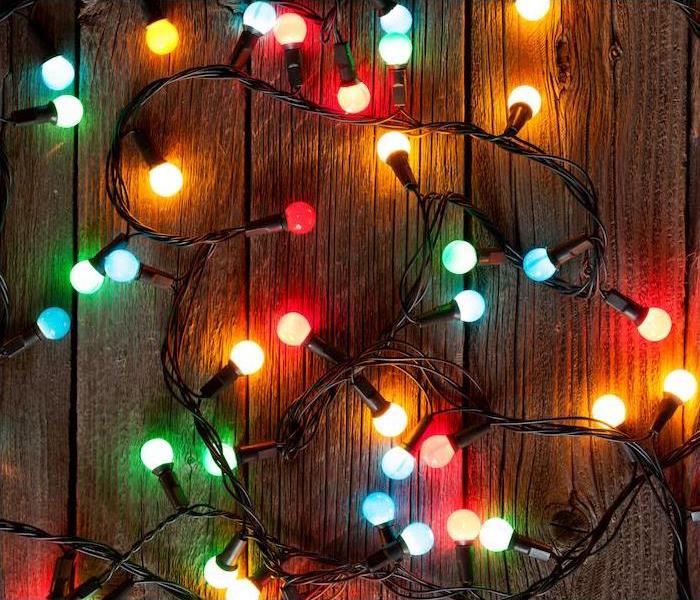 Make sure your fire risk is low during the holidays. If you experience any damage, SERVPRO of Gwinnett County South will be here to help.
Make sure your fire risk is low during the holidays. If you experience any damage, SERVPRO of Gwinnett County South will be here to help.
It is possible for a fire to begin no matter what time of year it is, but during the winter months, it is wise to be extra cautious about them. Winter is the season when most fires begin in houses as reported by the Red Cross, because there are far more activities occurring that make them likely to occur.
Wintertime is the season of making big meals, baking goodies, turning up the heat and decorating the home—but with each of these things comes a risk. These things can still be enjoyed as long as safety remains at the forefront of concern.
Practicing Fire Safety During Winter Activities
Keep safe when cooking. At any time of year, cooking has been shown to be the top cause of house fires—and during the winter season, it becomes even more prevalent. Cooking and baking are a fun way to enjoy winter treats, but it is important to always practice fire safety in the kitchen and keep a fire extinguisher handy in case there are any flare-ups that can quickly be put out.
Heat the house with proper precautions. The warmth of a fireplace or space heater is nice, but these things present serious dangers when used improperly. Space heaters have gotten safer with recent technological developments, so it is smart to make sure you are using a model with built-in safety features. For fireplaces, regular chimney maintenance is key and a fire should never be left to burn unattended.
Decorate with care. Decorating for the winter holidays is a fun activity, but with the introduction of new electrical wiring brings new concerns. Around 25% of Christmas tree fires start due to wiring, which can be prevented with proper precautions. Never use wiring that is frayed and avoid leaving lights plugged in if you are away or going to sleep. It is also wise to not plug too many things into a single outlet or power strip, as this can lead to sparks.
If you have damage due to a house fire, you can depend on us to help. Contact us 24 hours a day to report damage and receive a quick response from our certified restoration technicians. Get in touch today.
Reduce the Chances That a House Fire Will Start | SERVPRO® of Gwinnett County South
10/15/2020 (Permalink)
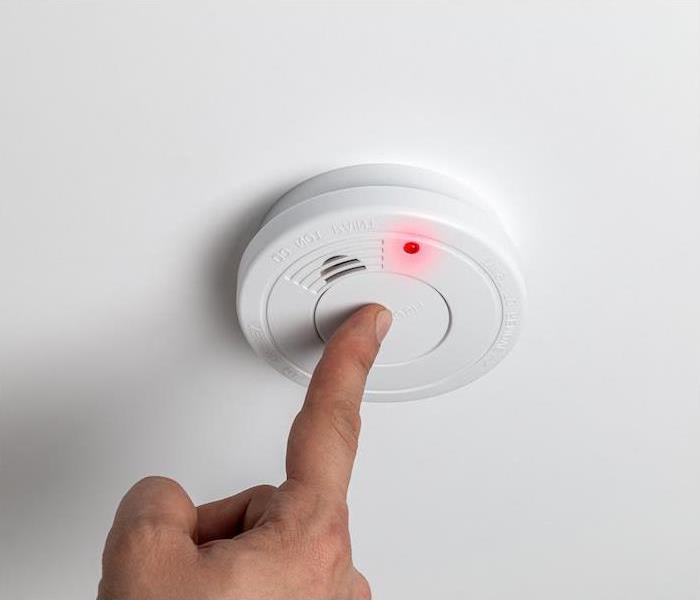 If you experience any property damage due to a fire, we are here to help. Contact SERVPRO of Gwinnett County South to learn more.
If you experience any property damage due to a fire, we are here to help. Contact SERVPRO of Gwinnett County South to learn more.
We can all realistically say we hope to never experience a house fire, but hoping one does not happen and doing what you can to prevent it are two different things. Fires can spread from a single flame in under a minute, but doing what you can to ensure one never starts can go a long way.
Thankfully, fire safety is something everyone can implement around the house through some planning and some prevention. Though you can never get rid of your chances of experiencing a house fire, you can significantly reduce them to keep your household safer.
How Can I Lessen the Chances of Experiencing a House Fire?
Check your smoke detectors. Having smoke detectors installed throughout your home is so important, as they will alert you if there is a fire in the home. Make sure yours are operational by checking them on a monthly basis, and replace them according to your manufacturer’s instructions to prevent any defects from occurring.
Create a fire escape plan. It is important for the safety of everyone in the household that you have a comprehensive fire escape plan that is regularly practiced. It should only take two minutes to exit the home, and every room should have two ways to get out so no one will be trapped in the house depending on where the fire starts.
Limit your fire risks. Whenever you practice good habits around the house, you are reducing the chances a fire can start. Simple things are extremely effective in house fire prevention—never leaving the room while cooking food, not leaving open flames unattended and never running wires under rugs or behind furniture are great tips to reduce your house fire chances.
Keep a fire extinguisher handy. While you should only use a fire extinguisher if it is completely safe to do so, it is good to have one handy in case the need arises. Any time you cook, grill or use an open flame, ensure you have an operational fire extinguisher nearby and are informed on how to use it.
If your home is damaged by a house fire, we are here to help. Our expert fire restoration technicians are here 24⁄7 to spring into action as soon as you call. Contact us at any hour to report your damage and receive a quick response.
Practicing Grill Safety to Lower Your Chances of a Fire | SERVPRO® of Gwinnett County South
7/27/2020 (Permalink)
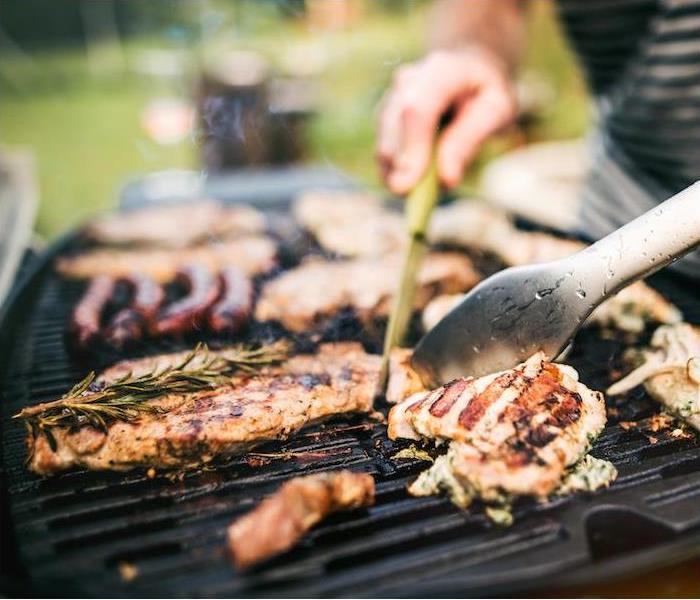 SERVPRO of Gwinnett County South are the fire restoration experts. To learn more give us a call or contact us online.
SERVPRO of Gwinnett County South are the fire restoration experts. To learn more give us a call or contact us online.
Grilling is synonymous with summertime, both because it is an enjoyable reason to get outside and because grilled food always seems to turn out extra delicious. If you are like us and love to use your grill often, we recommend brushing up on your grill safety skills to avoid any harmful fires from popping up at your next cookout.
While this may seem like a minor concern, the U.S. Fire Administration’s research tells a different story, where nearly 6,000 fires are caused by accidents during grilling sessions annually. Making sure you know how to prevent this is key to grilling safely every time.
Brushing Up on Your Grill Safety Skills
Create a safe zone around your grill. Of course, convenience might be the factor that comes to mind when deciding where to place your grill, but do not forget about safety concerns as well. A sudden flare-up can ignite anything in its path, which is why a minimum of three feet of clearance is advised for wherever you set up your grill station.
Clean your grill grates often. Having food caked onto your grill grates is not just bad for your cooking experience—it is also a common cause of grill fires. Leaving grease and crumbs to accumulate on the grates can lead to a sudden fire if they become too hot, so cleaning your grill after each use is a good habit to get into.
Never leave the grill unattended. A grill flare-up can be sudden, and even if you are just walking away for a moment, it can lead to a fire that quickly turns out of hand. Never walk away from the grill without designating another person to watch it, and be sure you have an operational fire extinguisher nearby in case a flare-up does occur.
Inspect the grill regularly. Before you turn on the gas and get to cooking, inspect your grill carefully for any defects, wear or tear. Gas connection lines that run from your propane tank can fail with time, leading to a gas leak that can explode when a flame is applied. Instead of chancing it, a quick visual inspection will tell you everything you need to know.
If you have a grill fire that does damage to your home, we are here to help. You can call us any time, day or night, to have a quick response from our restoration experts.
Steps to Take After a House Fire | SERVPRO® of Gwinnett County South
6/11/2020 (Permalink)
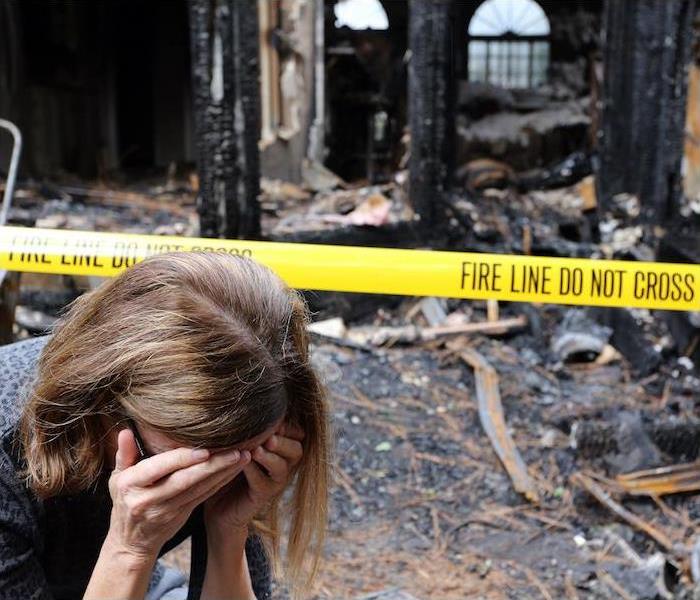 If your home is damaged in a house fire, SERVPRO of Gwinnett County South is here to help. Contact us for any fire restoration needs.
If your home is damaged in a house fire, SERVPRO of Gwinnett County South is here to help. Contact us for any fire restoration needs.
Having a house fire strike your home is a fearful and overwhelming life experience. Whether it was extinguished immediately or continued on to become severe, the damage caused by a house fire can be far-reaching and difficult to deal with.
In order to help you recover, we have included some things to remember in order to pick up the pieces from a house fire and be able to continue on with life.
Picking Up the Pieces Following a House Fire
Prepare yourself for what to expect. Though many of us are familiar with fire damage in the abstract, seeing it firsthand in a way that impacts your own life is a different experience altogether. Prepare yourself before you enter your home, and remember that fire damage can often impact areas that were not even near the flames due to the way that smoke and soot can travel.
Wait to enter your home. While springing into action is a common reaction following a house fire, it is important that you are not doing anything that could put you in harm’s way. Fires can lead to structural issues for a home, and entering too early could put you at risk. Be sure to check with officials to make sure it is completely safe before you attempt to go back into the home.
Contact your insurance company. Filing a fire insurance claim is different with every provider, so getting in touch with yours to learn more about the process will help you make sure you follow the right protocols and get the most out of your claim.
Document the damages. Creating an inventory list and taking plenty of photos is a great way to stay organized and not accidentally leave something out. Go room by room to document the damages to your belongings and structures so you have clear records both for your benefit and to ease the difficulties of filing an insurance claim.
Contact your restoration company. The aftermath of a fire can be emotionally taxing to deal with, which is why we always recommend working with a reputable, professional restoration company to make things easier on your family. A good restoration crew will give you immeasurable peace of mind so you can worry less about the recovery process and focus more on healing.
If your home is damaged in a house fire, you can count on us to help you. Get in touch at any hour for a quick response.
Fire Safety During Summer
5/27/2020 (Permalink)
Summer is a glorious season full of vacations, cookouts and firework shows, but along with all the festivities are plenty of visits to emergency rooms—especially in July. Each year around 230 people are injured badly enough to require medical treatments after firework-related incidents, according to the U.S consumer Product Safety Commission. In addition to causing injury, fireworks are responsible for thousands of house fires each year with countless numbers of dollars in property damage.
There is nothing like firing up the grill during the summer months! Did you know, July is the peak month for grill fires? A backyard barbecue can become dangerous quickly if proper safety precautions aren’t considered. As your local SERVPRO professional, we want you to have an enjoyable and safe summer. Consider the following tips to help ensure your summer celebrations are disaster free!
-Grills should only be used outdoors.
-The grill should be placed far from the home, deck railings, garages and out from under eaves and over hanging branches.
-Keep your grill clean by removing grease or fat buildup from the grill and in trays below the grill.
-Never leave your grill unattended.
- When using a charcoal grill, let the coal completely cool before disposing in a metal container.
-If you are using fireworks or standing nearby should wear protective eye-wear.
-Do not to try to relight or handle malfunctioning fireworks. Keep a bucket of water nearby to fully extinguish fireworks that don’t go off or in case of fire. Children should never pick up fireworks that may be left over as they may still be active.
-The Safest way to enjoy fireworks is to attend a public display conducted by trained professionals.
Tips after a house fire
5/22/2020 (Permalink)
- Ask whether it is safe to come into the home. Do not attempt to enter the structure if the fire authorities deem it unsafe. They may establish a safety zone, but never assume a room is safe.
- Know who to call.
-Contact family members and let them know you are safe and unharmed.
-Contact your insurance agent. They will be able to talk you through the necessary steps, including proper documentation and emergency lodging and living expenses (keep all of your receipts!) The insurance company may assist in securing a company to help with clean up options.
-You may request a fire mitigation company at this time for contents cleaning, structure cleaning, restoration etc. Contact SERVPRO® of Gwinnett County South at 770-448-5782.
-Another call may be to your landlord if applicable, and to your local American Red Cross. Our company is the preferred restoration partner to The American Red Cross.
- Secure the property to prevent possible looting. SERVPRO® of Gwinnett County South is available to assist with securing property/ Board Ups.
- If water hoses were used to exterminate the fire, drying your home is critical. It is best to call the professionals at SERVPRO® of Gwinnett County South to do water/ fire cleanups. Water can lead to mold damage if not dried properly. Our company is an approved restoration contractor for many major insurance carriers and adheres to the highest standards in the restoration industry.
- Seek counseling if needed. Children and adults can feel a traumatic sense of loss and may need help to avoid a lasting sense of sadness and disorientation after a house fire. Do not be afraid to reach out for help. A house fire is a traumatic event and individuals need to be treated with respect and compassion by those close to the process of rebuilding.
Increasing Numbers of House Fires
5/5/2020 (Permalink)
According to the National Fire Protection Association, cooking fires are the number one cause of home fires and home injuries. During the past few months, we have noticed an increase in home fires. Most likely due to the number of restaurants being closed during the current pandemic and families having to cook at home more often than usual. If you don’t practice safe cooking habits, your routine dinner plans could become hazardous very quickly. The leading cause of fires in the kitchen is unattended cooking.
Tips for avoiding kitchen fires:
- Be alert! If you are sleepy or have consumed alcohol don’t use the stove or stove-top.
- Stay in the kitchen while you are frying, grilling, boiling or broiling food.
- If you are simmering, baking or roasting food, check it regularly, remain in the kitchen while food is cooking and use a timer to remind you that you are cooking.
- Keep anything that can catch fire – oven mitts, wooden utensils, food packaging, towel or curtains – away from stove-top.
If a fire occurs while you are cooking, consider the following safety protocols to help keep you and your family safe.
- Keep a lid nearby when you are cooking to smother small grease fires. Smother the fire by sliding the lid over the pan and turn off the stove-top. Leave the pan covered until it is completely cooled.
- If you try to fight the fire, be sure anyone else in the home is getting out and that you have a clear way out.
- For an oven fire, turn off the heat and keep the door closed.
- If the fire is out of control, just get out! When you leave, close the door behind you to help contain the fire.
- Call 9-1-1 or the local emergency number after you leave.
SERVPRO of Gwinnett County South and their professional team are always here to help. Call us today at (770)448-5782
Contents in the home after a fire
4/20/2020 (Permalink)
Your home contains many of your most valuable possessions and items you love the most. Your business is your livelihood. The team at SERVPRO® of Gwinnett County South understands just how trying, disruptive, and traumatic major losses such as a fire can be.
As part of our fire restoration service, we don't just pay attention to the structure; we'll also help take care of the contents of your home or business, as well. Some of our contents services include:
Inventory – One of the first priorities in fire restoration is to complete an accurate inventory to help ensure you can properly account for all of your belongings. Your SERVPRO of Gwinnett County South technician can provide a detailed room-by-room inventory of contents, including digital photographs, suitable for filing insurance claims forms and relieving you of this often stressful and time-consuming process.
Move Outs – When the structure has suffered extensive damage, the cleanup and restoration process may need to be facilitated by relocating the contents for cleaning, deodorization, and storage while structural repairs are being completed. Our supervised moving crew can carefully pack and move the entire contents of your home or office.
Contents Cleaning – All of the restorable contents in affected areas will be professionally cleaned and deodorized. This includes area rugs, furniture, draperies, and upholstery. SERVPRO of Gwinnett County South technicians begin by carefully inspecting and testing all fabrics in the structure to determine which cleaning methods are most appropriate; we provide wet or dry cleaning methods. Additionally, all of the other restorable contents will be cleaned and deodorized to as near as preloss condition as possible; this includes electronics, art, wood furniture, kitchen items, clothing, bedding, and much more.
When a fire takes control of your life, we help you take back control. Call SERVPRO of Gwinnett County South for help: (770)448-5782.
Steps to take after the fire | SERVPRO of Gwinnett County South
10/28/2019 (Permalink)
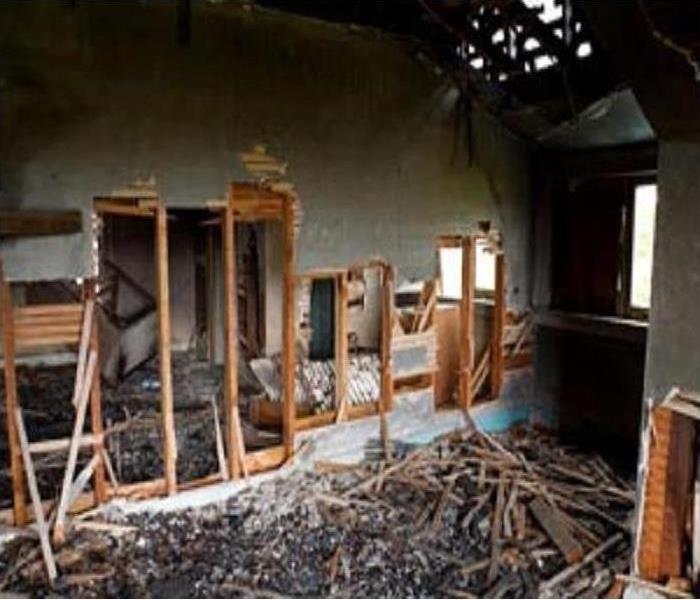 The feeling of loss felt after a fire can be overwhelming.
The feeling of loss felt after a fire can be overwhelming.
- Ask whether it is safe to enter the home. Do not enter if the fire authorities deem it unsafe. They may establish a safety zone, but never assume a room is safe, until it has been cleared to enter.
- Know who to call.
- Contact family members and let them know you are safe and unharmed.
- Contact your insurance agent. They will be able to talk you through the necessary steps, including proper documentation and emergency lodging and living expenses (keep all of your receipts!) The insurance company may assist in securing a company to help with clean up options.
- You may request a fire mitigation company at this time for contents cleaning, structure cleaning, restoration etc. Contact SERVPRO® of Gwinnett County South at 770-448-5782.
- Another call may be to your landlord if applicable, and to your local American Red Cross. Our company is the preferred restoration partner to The American Red Cross.
- Secure the property to prevent possible looting. SERVPRO® of Gwinnett County South is available to assist with securing property/ Board Ups.
- If water hoses were used to exterminate the fire, drying your home is critical. It is best to call the professionals at SERVPRO® of Gwinnett County South to do water/ fire cleanups. Water can lead to mold damage if not dried properly. Our company is an approved restoration contractor for many major insurance carriers and adheres to the highest standards in the restoration industry.
- Seek counseling if needed. Children and adults can feel a traumatic sense of loss and may need help to avoid a lasting sense of sadness and disorientation after a house fire. Don’t be afraid to reach out for help. A house fire is a traumatic event and individuals need to be treated with respect and compassion by those close to the process of rebuilding.
Common Causes of House Fires | SERVPRO® of Gwinnett County South
9/24/2019 (Permalink)
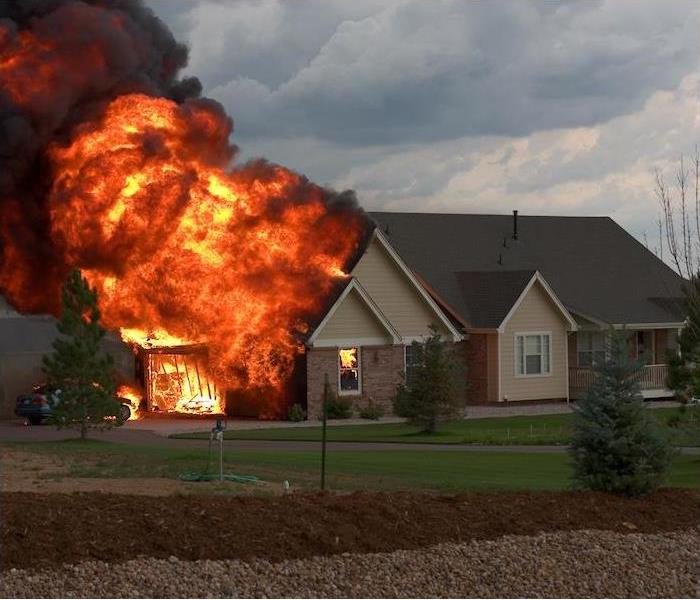 A fire to this home quickly grows out of control.
A fire to this home quickly grows out of control.
It is highly advisable for homeowners to have working smoke alarms in every room of the house, but there are additional ways to be vigilant about fire prevention.
A variety of events can cause house fires, from the most obvious fire hazard to the least conspicuous household supply. It is important to know the risks so you can prevent them and keep your home safe from fires.
How Frequent Are House Fires?While the reasons to be vigilant about fire protection are numerous, many people do not realize just how often they occur. According to the NFPA, a home fire starts every 24 seconds.
Cooking incidents make up over half of reported fires, but many other things around the home can be a cause.
What Are Common House Fire Causes?There are many causes of house fires that most people would not even think of. Understanding the everyday occurrences that lead to fires and how to prevent them can go a long way in prevention:
Faulty smoke alarms. Smoke alarms should be replaced every 10 years, and checked using the built-in test button once per month.
Built-up dryer lint. As lint gathers in the tray of the dryer, it becomes the perfect combustible material. As the dryer heats up, it can eventually lead to a fire if the tray is left uncleaned.
Unmonitored open flames. If an open flame is present—whether from cooking, candles or a fireplace—there is always the chance it will spread.
Frayed electrical cords. Frayed cords should be replaced immediately to prevent them from sparking. Additionally, running cords under rugs and furniture can be a hazard, as they can put off heat and combust.
Combustible household supplies. Chemicals and aerosol cans are around nearly every home, and many of them are highly combustible. These products should be kept away from heat sources to mitigate risks.
If your home has suffered damage from a house fire, give us a call. We are certified in fire and soot remediation, and here to help 24⁄7.
Grilling Safety Tips | SERVPRO® of Gwinnett County South
5/30/2019 (Permalink)
As the temperatures have already started to soar, it’s time to start thinking about summer. There is nothing like firing up the grill during the summer months! A backyard barbeque can become dangerous quickly if proper safety precautions aren’t considered. As your local SERVPRO® professional, we want you to have an enjoyable and safe summer. Consider the following tips to help ensure your summer celebrations are disaster free!
- Propane and charcoal BBQ grills should only be used outdoors.
- The grill should be placed well away from the home, deck railings and out from under eaves and over hanging branches.
- Keep children and pets away from the grill area.
- Keep your grill clean by removing grease or fat buildup from the grills and in trays below the grill.
- Never leave your grill unattended.
- When using a charcoal grill, let the coal completely cool before disposing in a metal container.
- Keep a fire extinguisher nearby as a safety measure.
Practicing a “Restore vs. Replace” Mentality | SERVPRO® of Gwinnett County South
5/23/2019 (Permalink)
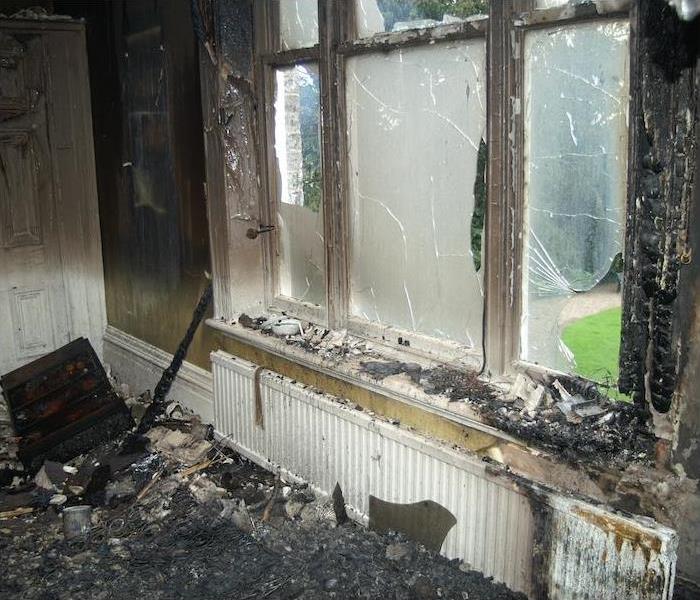 This fire damaged home was caused by an electrical fire.
This fire damaged home was caused by an electrical fire.
It’s well known that when disaster strikes, we can get there faster, but that is not the only reason why we should be one of your first calls if the worst should occur.
When it comes to your property, our technicians have a “restore first” mentality, which is aided by the use of specialized equipment and cleaning techniques. This mentality also helps reduce the interruptions to life and helps get your home or business back to pre-disaster condition.
Restore First for Fire DamageKnowing what to do after a fire has damaged your property is stressful, but that’s where we come in. Once you’ve contacted us, our team will spring into action.
Every fire damage event is different, and while our highly trained team can come up with a unique solution that is tailored to your needs, the general process remains the same.
Here are the steps that are included in our process:
1. Emergency contact. Once you’ve contacted us, you will be asked a series of questions regarding the fire damage. This helps us make sure our team is dispatched with the appropriate equipment and resources.
2. Inspection and fire damage assessment. Upon arrival, the team will inspect and test adjoining rooms of the property to determine the extent of fire, smoke and soot damage. This helps us determine the right plan of action moving forward.
3. Immediate board-up and roof-tarp service. Because fire damage can compromise windows, walls and roofs, we will make sure that your property is secure and protected from further damage by boarding up missing windows and walls and placing a tarp on damaged roofs.
4. Water removal and drying (if water damage is present). Since water damage can accompany fire damage, we’ll begin the removal process right away. Dehumidifiers and air movers are brought in to remove the remaining water and finish up the drying process.
5. Removal of smoke and soot from all surfaces. We have specialized equipment and techniques that are used to remove smoke and soot from ceilings, walls and other surfaces.
6. Cleaning and sanitizing. If it is possible, we will clean restorable items and structures. Not only will they be cleaned, but industrial air scrubbers and fogging equipment are used to help remove odors.
7. Restoration. This is our final step, getting your property back to pre-fire condition. Restoration can include minor repairs like replacing drywall, painting and installing new carpet. It could also call for major repairs like reconstruction of damaged areas.
Remember, if you need us, we’ll be there—no matter the time or day. The team of highly trained restoration experts at SERVPRO® of Gwinnett County South is available for emergency cleanup and restoration services 24 hours a day, seven days a week.
Ways to Prevent Fires While Cooking | SERVPRO® of Gwinnett County South
5/8/2019 (Permalink)
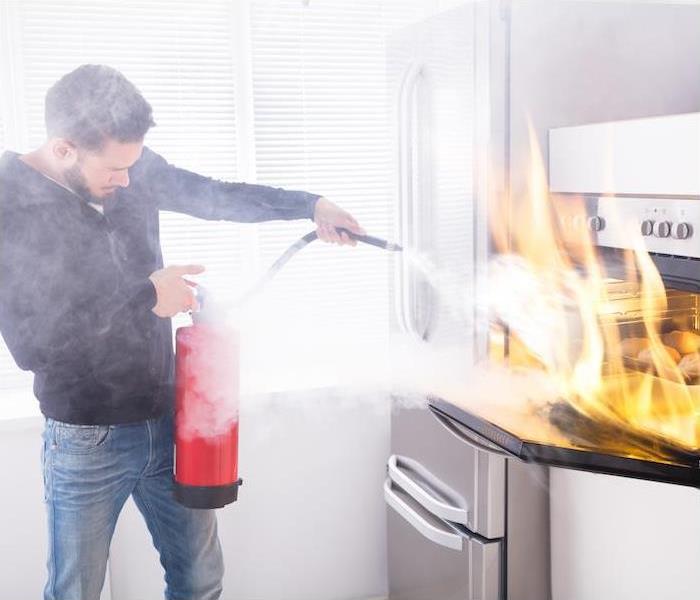 Extinguishing an oven fire.
Extinguishing an oven fire.
Even though the kitchen can be a wonderfully versatile place where family and friends gather to catch up or enjoy preparing and eating a meal together, it is also a place where many home fires occur.
Cooking fires are the No. 1 cause of home fires and injuries. The leading cause of these kitchen fires is unattended cooking.
State Farm paid out a whopping $130 million for homeowners insurance claims related to grease and other cooking fires in 2017. According to the insurance company, these are the worst states for kitchen fires:
- North Carolina
- Texas
- Pennsylvania
- California
- Ohio
- Illinois
- Maryland
- New York
- Alabama
- Georgia
Fire Safety Tips in the KitchenStaying in the kitchen while cooking is not the only fire safety precaution you should observe. Take a look at these other helpful tips to observe while cooking:
1. What type of clothing are you wearing? Does your outfit have long, flowing sleeves or is it big and baggy? It could catch on fire if you aren’t careful while cooking over the stove. It’s best to wear short or close-fitted sleeve shirts and make sure any baggy shirts are tucked in or tied back.
2. What type of items are you placing around or on the stovetop? Make sure you don’t have kitchen towels, oven mitts, appliance cords or even curtains too close to the stovetop when cooking. Ideally, anything flammable will be moved away from it.
3. Do you have a fire extinguisher in/near the kitchen? Hopefully you have at least one fire extinguisher located in your home, ideally one that is near your kitchen. Make sure you know how to properly use the extinguisher, just in case it is ever needed.
4. How are you disposing of hot grease? While the grease may not be on fire, it could be hot enough to cause something in the trash to burn. You should let the grease cool a bit and then dispose of it in an old coffee can. Also, know the smoke points of the oils you cook with. Be sure to never subject a low-smoke point oil to high heat when cooking, as it could catch fire.
5. Do you have a fire escape plan? Thinking about the worst-case scenario is never fun, but it’s better to be prepared than unprepared if an emergency were to occur. Go over exit routes and designated meeting points with your family, making sure that everyone knows what to do.
Fire safety in the kitchen is an absolute necessity, as it can help prevent dangerous and destructive cooking fires. If your home has experienced damage from a cooking fire, know that SERVPRO® of Gwinnett County South is here to make it “Like it never even happened.”
Smoke and Fire Deodorization
4/26/2019 (Permalink)
Smoke and Fire Deodorization
Strong smells often linger after having a fire. The type of smells that develop are determined by the type of material that was on fire or smoldering. A hot fire that burned natural building materials will smell different than that of a protein fire from frying or a slow smoldering fire that burned plastics and rubber. These odors can cause years of problems if they are not handled by a professional. At SERVPRO of Gwinnett County South we employ a multi-step approach to deodorization.
Source Removal
The first step in deodorization is to find the source. In the case of a fire the area may be obvious, however there are many causes of odor that may not be easily noticed. Once the source is found by our trained technicians we must remove it.
Cleaning
The next step in the process is to clean the effected areas. Many of the soot particles are deposited both on and often inside certain building materials depending on how hot the fire was. Our technicians are trained on different cleaning strategies dependent on the surface to be cleaned and the soils deposited.
Deodorizing
We employ a combination of pairing and masking deodorization techniques depending on the situation. Hot fires open the pores of building materials where foul smelling soot can be deposited. When the fire is extinguished and the materials cool down, the pores of these material shrink, thus trapping odor molecules inside. In such cases we will use a pairing agent along with a Hot Thermal Fogger to reopen the pores. The pairing agent will attach to and change the odor molecule so that it no longer smells.
Sealing
While sealing of wood is not always required, we will often do this on studs and structural members. One of the reasons for sealing is because these building components are often covered up by drywall, or they are located in hard to reach areas. Summer brings hot weather and as building materials heat up, these materials are capable of releasing odors. Sealing ensures that any soot not completely eliminated from cleaning remains trapped.
Deep Frying a Turkey Safely
11/13/2018 (Permalink)
Every holiday people are lured in by the promise of moist, sweet turkey meat and the deep turkey fryer has become an increasingly popular way to make a Thanksgiving or Christmas dinner. However, cooking up Tom the Turkey in a vat of boiling oil does come with many dangers.
According to the National Fire Protection Association, every year deep-fryer fires are responsible for five deaths, 60 injuries, the destruction of 900 homes and more than $15 million in property damage.
Therefore it is most important to follow a few safety precautions if you choose to fry a turkey for the holidays.
- Don’t Deep Fry a Frozen Turkey
Frozen turkeys are full of moisture, and we all know how water and hot oil don’t mix well. Make sure that your turkey is completely thawed before trying to fry it.
- Turkey Fryers can Easily Tip Over
Be sure that you place your turkey fryer on solid footing so that it will not tip over, spilling hot cooking oil over a large area.
- Don’t Let Oil Get Too Hot
When oil gets around 400-425 degrees it can catch on fire by itself. Most fryers do not have thermostat controls, and it would be prudent to have a thermometer to make sure you keep the oil below 400 degrees.
An overfilled cooking pot can cause oil to spill when the turkey is put in, and when the oil runs down next to the flame on the burner, a catastrophic fire could result.
- Never Deep-Fry Indoors or in a Garage
The best place to use a turkey fryer is on a level spot out in your yard away from the house or anything flammable.
May these tips help you and your family to enjoy a safe holiday with a delicious fried turkey. Remember to call SERVPRO of Gwinnett County South if you have any water, fire or mold problems during the holidays. Call us at 770-448-5782. We can help 24/7.
Candle Safety
11/13/2018 (Permalink)
As peak hurricane season continues through the end of November and winter storms follow, it’s critical that you and your family know the best practices for staying safe during power outages.
While flashlights and battery-powered lamps are safe sources of light during lengthy power outages, candles are also reliable alternatives if used safely. It’s important to remember that a candle is an open flame, which always runs the potential risk of a fire-related accident. According to the National Fire Protection Association, more than 20% of candle fires involving fatalities occur during a loss of power.
Here are some safety precautions to follow when the lights go out:
DO pay attention to proximity. It’s important to make sure that you’re not burning a candle on or near anything that could catch fire. Keep candles at least 12 inches away from furniture, drapes, bedding, carpets, books, or any other flammable objects. Place burning candles at least 3 inches apart from one another so they don’t melt one another or burn improperly.
DON’T leave burning candles unattended. Try to restrict people and candles to one room in the house so the location of family members can always be accounted for and you can keep an eye on open flames. Extinguish all candles before going to bed or leaving a room.
DO place candles on a fire-resistant surface. Place a handle in its holder on a stable, nonflammable surface, such as a metal cookie sheet, frying pan or ceramic plate.
DON’T light a candle if you smell gas. If you smell gas inside or outside your home, immediately put out all open flames, shut off your gas supply, leave the area, get to a safe place, and call 911.
DO use pillar or container candles. Broader-based candles are a suitable option for power outages, as these are less likely to be accidentally knocked over. When possible, candles should be enclosed within glass hurricane holders or globes.
DON’T use candles as a search guide or night light. Avoid walking around with a candle. Dark rooms can increase the chance of tripping or brushing against a flammable item. Use a flashlight instead.
DO keep candles out of reach of children and pets. Place candles up high to avoid the risk of pets, children, or adults accidentally bumping candles over in the dark.
If you have any questions on candle safety or need any fire mitigation services, contact our franchises SERVPRO of Gwinnett County South at 770-448-5782. We are available 24/7 to assist.
SERVPRO Can Handle Your Fire Loss
5/29/2018 (Permalink)
A fire in home, fire in business or commercial fire damage can be a traumatic experience for any homeowner. When one experiences a fire in home, fire in business or commercial fire damage, it is pertinent to keep your composure and take all of the necessary steps to ensure that the life of you and other people are safe. In the aftermath of a fire, fire restoration services can assist in getting rid of the damage in your home. Companies that offer fire cleanup provide you with all of the services needed to restore your home.
After one experiences a fire damage from a fire in home, a fire in business or commercial fire damage, it is important to contact a fire restoration company immediately. By scheduling fire restoration services right away, you have the ability to minimize the losses, smoke damage, soot damage and the time needed for fire cleanup. You are also preventing a decline in air quality. The air quality deteriorates immediately after a fire. With better air quality, you are able to complete fire cleanup sooner. To begin the restoration process, a representative will ask a host of questions pertaining to the fire, smoke damage, soot damage, and fire loss. Fire loss refers to the items lost during a fire in home, fire in business or commercial fire damage.
When our franchises arrives at your home, they will begin the process by assessing the severity of the fire damage, smoke damage, soot damage, and fire loss. After the fire restoration company has completed their assessment, they will initiate the restoration process by removing smoke damage. The air quality is directly tied to smoke damage and soot damage. Thus, when the smoke damage is eliminated, the air quality improves. Due to smoke odors lingering long after fire damage, it is important to remove smoke damage first. Otherwise, it will make the fire loss more profuse and fire cleanup more of a hassle. During the initial phase of the restoration process, your home’s windows may be boarded. This is done to prevent additional damage from occurring. They may also place tarps on damaged roofs. The company will cautiously inspect to determine the severity of the fire loss, smoke damage, and soot damage. This gives the company the ability to develop a fire cleanup strategy.
The final phase of fire restoration is fire cleanup. The fire restoration company is trained to restore fire damage in a fire in home, a fire in business or commercial fire damage. After the fire cleanup is finished, your home should be as good as new. Do not hesitate to schedule fire damage restoration services right away. Restoration is the final step and it may vary depending of the severity of the fire. Restoration typically involves repairs such as replacing drywall, painting, and installing new carpet. In severe cases, it may involve major repairs such as the replacement of multiple areas or rooms in a home or a business. Call our franchises SERVPRO of Gwinnett County Southeast or SERVPRO of Gwinnett County Southwest at 770-448-5782 for all your fire damage needs or questions.
Tips after a Fire Loss
5/29/2018 (Permalink)
We’re not going to kid you. Fire damage restoration is tough work. People call our franchises frequently to ask for advice on how to clean up after a fire. Here are seven of the best tips we give people who ask about fire damage restoration.
Most people can put these tips into practice. But remember that fire damage restoration takes time, work, and skill. Realistically consider whether you want to try these ideas on your own or whether you’d be better off hiring a certified fire restoration team who will guarantee their work.
Remove Smoke Damage
With any fire you’ll have a degree of smoke damage to your walls, wall paper, and paint. If the smoke damage is not too serious, you should be able to scrub it clean with detergents and bleach. Soot from smoke damage is greasy stuff, so always try to dust as much of it off from a surface before trying to scrub the surface clean. Often, you’ll want to repaint, but make sure all surfaces are clean and dry before you paint.
Limit Activity & Other Simple Fire Damage Restoration Steps
Until your house is restored, limit your activity and movement in the house. This helps prevent soot particles from being embedded into upholstery and carpets. Keep people’s hands clean so you don’t further soil upholstery, walls, and woodwork. Protect your things by placing clean towels or old linens on rugs, upholstery, and carpet traffic areas. Before you clean know the best cleaning method for that particular cleaning job (one example: Clean and protect chrome with a light coating of petroleum jelly or oil.) Wash both sides of the leaves on your houseplants. Change your HVAC filter and tape double layers of cheesecloth over air registers.
Get Rid of Mold & Mildew
Firefighters are great. They save many a live and many a home. But they do introduce mold and mildew into houses when they must use water to extinguish the fire. We highly recommend you hire fire damage restoration professionals to deal with mold and mildew. Mold and mildew can cause serious health problems. It’s difficult for a nonprofessional to know for certain if he’s clean up all the areas affected by the mold and mildew. And mold and mildew can contaminate your furniture, carpets, clothing, mattresses, walls, and vents. The best thing you can do immediately is to air out every room and clean out all vents and filters.
Replace Carpets. Clean And Dry Your Floors
Your floors and carpets end up absorbing the worst of the damage from all the water used to put out a fire. In almost every case, we would recommend that you pull up any carpets that have water damage and replace them. Water can also seep underneath vinyl flooring and into the cracks in hardwood. You must address this. If you have experience with flooring, you can lift it up and clean under it. Once flooring has been removed, you would need to dry the structure by placing fans and/or dehumidifiers. But you may want to call a professional fire damage restoration company to assist you.
Avoid Smearing Soot Into Clothing
Cleaning smoke damage from clothing is one of the biggest jobs you’ll have after a fire. Make sure you don’t smear the greasy soot into the clothing or just throw the smoky clothes into the wash. Often dry cleaning is the best bet, and you should ask around local dry cleaners to see if any have experience with post-fire laundry.
Scrub, Soak, And Cleaning Dishes
Dishes are also important items to clean thoroughly after a fire because they will be in contact with your food. Scrub all dishes well, let them soak in a solution of bleach and water (2 tablespoons of bleach per gallon) for at least 20 minutes and scrub some more for safety. When in doubt, if a dish, pot, or pan won’t come clean, cut your losses and throw it out – especially rubber or wooden dishes that absorb smoke.
Contact SERVPRO of Gwinnett County South at 770-448-5782 for all your needs.
After the Fire Trucks Leave
5/17/2018 (Permalink)
After the fire trucks leave, your home likely suffers from fire and smoke damage and extensive water damage from firefighting efforts. SERVPRO has the specialized fire restoration training needed to restore your home to pre-fire condition.
Have Questions About Fire, Smoke, or Soot Damage?
Call our franchises SERVPRO of Gwinnett County South at 770-448-5782.
Every fire damage event is a little different, and requires a unique solution, but the general process stays the same. The steps listed below illustrate our process for the “typical” fire damage emergency.
Step 1: Emergency Contact
The restoration process begins when you call SERVPRO of Gwinnett County Southeast, which is a 24 hours emergency service provider. Our representative will ask a series of questions regarding the fire damage event that will help us dispatch our IICRC Certified Fire Technician with the appropriate equipment and resources.
Step 2: Inspection and Fire Damage Assessment
Our Professionals will carefully inspect and test adjoining rooms of your property to determine the extent of the fire, smoke, and soot damage. This step is crucial to developing a plan of action.
Step 3: Immediate Board-Up and Roof-Tarp Service
Fire damage can often compromise windows, walls, and roofs. To maintain security and to protect against further damage, the technician can board up missing windows and walls.
Step 4: Water Removal and Drying (if water damage is present)
The water removal process begins almost immediately and removes the majority of the water. They will then use dehumidifiers and air movers to remove the remaining water and complete the drying process.
Step 5: Removal of Smoke and Soot from All Surfaces
The technicians use specialized equipment and techniques to remove smoke and soot from ceilings, walls, and other surfaces.
Step 6: Cleaning and Sanitizing
They will clean all of the restorable items and structures that were damaged by the fire. They use a variety of cleaning techniques to restore your belongings to pre-fire condition. They’re also trained to remove odors using industrial air scrubbers and fogging equipment.
Step 7: Restoration
Restoration is the final step—getting your home or business to its pre-fire condition. Restoration may involve minor repairs, such as replacing drywall, painting, and installing new carpet; or it may entail major repairs such as the reconstruction of various areas or rooms in a home or business.
WHAT TO DO IMMEDIATELY AFTER A HOUSE FIRE
5/10/2018 (Permalink)
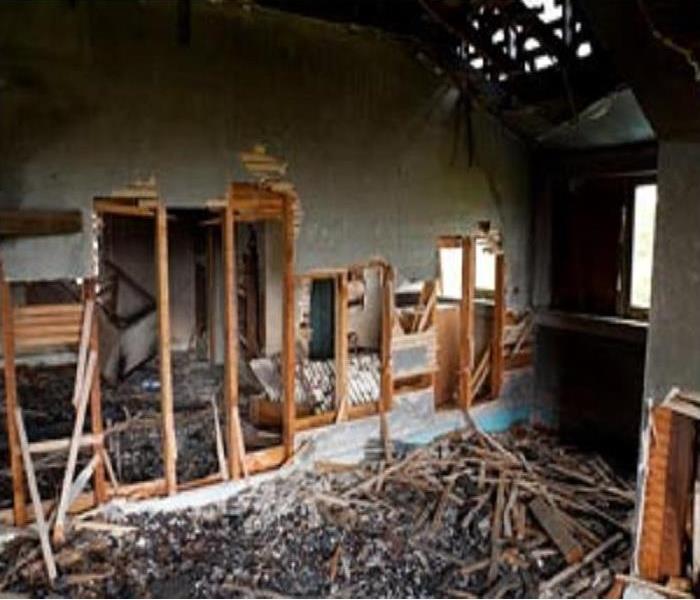
- Ask whether it is safe to enter the home. Do not enter if the fire authorities deem it unsafe. They may establish a safety zone, but never assume a room is safe, until it has been cleared to enter.
- Know who to call.
- Contact family members and let them know you are safe and unharmed.
- Contact your insurance agent. They will be able to talk you through the necessary steps, including proper documentation and emergency lodging and living expenses (keep all of your receipts!) The insurance company may assist in securing a company to help with clean up options.
- You may request a fire mitigation company at this time for contents cleaning, structure cleaning, restoration etc. Contact SERVPRO® of Gwinnett County South at 770-448-5782.
- Another call may be to your landlord if applicable, and to your local American Red Cross. Our company is the preferred restoration partner to The American Red Cross.
- Secure the property to prevent possible looting. SERVPRO® of Gwinnett County South is available to assist with securing property/ Board Ups.
- If water hoses were used to exterminate the fire, drying your home is critical. It is best to call the professionals at SERVPRO® of Gwinnett County South to do water/ fire cleanups. Water can lead to mold damage if not dried properly. Our company is an approved restoration contractor for many major insurance carriers and adheres to the highest standards in the restoration industry.
- Seek counseling if needed. Children and adults can feel a traumatic sense of loss and may need help to avoid a lasting sense of sadness and disorientation after a house fire. Don’t be afraid to reach out for help. A house fire is a traumatic event and individuals need to be treated with respect and compassion by those close to the process of rebuilding.
Dangers of Deep Frying a Turkey
11/15/2017 (Permalink)
Every holiday people are lured in by the promise of moist, sweet turkey meat and the deep turkey fryer has become an increasingly popular way to make a Thanksgiving or Christmas dinner. However, cooking up Tom the Turkey in a vat of boiling oil does come with many dangers.
According to the National Fire Protection Association, every year deep-fryer fires are responsible for five deaths, 60 injuries, the destruction of 900 homes and more than $15 million in property damage.
Therefore it is most important to follow a few safety precautions if you choose to fry a turkey for the holidays.
- Don’t Deep Fry a Frozen Turkey
Frozen turkeys are full of moisture, and we all know how water and hot oil don’t mix well. Make sure that your turkey is completely thawed before trying to fry it.
- Turkey Fryers can Easily Tip Over
Be sure that you place your turkey fryer on solid footing so that it will not tip over, spilling hot cooking oil over a large area.
- Don’t Let Oil Get Too Hot
When oil gets around 400-425 degrees it can catch on fire by itself. Most fryers do not have thermostat controls, and it would be prudent to have a thermometer to make sure you keep the oil below 400 degrees.
An overfilled cooking pot can cause oil to spill when the turkey is put in, and when the oil runs down next to the flame on the burner, a catastrophic fire could result.
- Never Deep-Fry Indoors or in a Garage
The best place to use a turkey fryer is on a level spot out in your yard away from the house or anything flammable.
May these tips help you and your family to enjoy a safe holiday with a delicious fried turkey. Remember to call SERVPRO of Gwinnett County South if you have any water, fire or mold problems during the holidays. Call us at 770-448-5782. We can help 24/7.
Celebrate Safely
11/15/2017 (Permalink)
Each November families gather to celebrate Thanksgiving by preparing a delicious feast, but if you don’t practice safe cooking habits, your holiday could become hazardous very quickly. According the National Fire Protection Association, cooking fires are the number one cause of home fires and home injuries, and Thanksgiving is the leading day for home cooking fires, with three times the average number. The leading cause of fires in the kitchen is unattended cooking.
Tips for avoiding kitchen fires:
- Be alert! If you are sleepy or have consumed alcohol don’t use the stove or stovetop.
- Stay in the kitchen while you are frying, grilling, boiling or broiling food.
- If you are simmering, baking or roasting food, check it regularly, remain in the kitchen while food is cooking and use a timer to remind you that you are cooking.
- Keep anything that can catch fire – oven mitts, wooden utensils, food packaging, towel or curtains – away from stovetop.
If a fire occurs while you are cooking, consider the following safety protocols to help keep you and your family safe.
- Keep a lid nearby when you are cooking to smother small grease fires. Smother the fire by sliding the lid over the pan and turn off the stovetop. Leave the pan covered until it is completely cooled.
- If you try to fight the fire, be sure other are getting out and that you have a clear way out.
- For an oven fire, turn off the heat and keep the door closed.
- If the fire is out of control, just get out! When pou leave, close the door behind you to help contain the fire.
- Call 9-1-1 or the local emergency number after you leave.
SERVPRO of Gwinnett County South and their professional team wish you a safe and happy holiday season.
Summer Safety Tips
7/15/2016 (Permalink)
 Happy 4th of July!
Happy 4th of July!
Summer is synonymous with vacations, barbeques and fireworks displays; but along with all the festivities are plenty of visits to emergency rooms—especially in July. Each year around 230 people are injured badly enough to require medical treatments after firework-related incidents, according to the U.S consumer Product Safety Commission. In addition to causing injury, fireworks are also responsible for thousands of house fires each year with millions of dollars in property damage.
There is nothing like firing up the grill during the summer months! Did you know, July is the peak month for grill fires? A backyard barbeque can become dangerous quickly if proper safety precautions aren’t considered. As your local SERVPRO professional, we want you to have an enjoyable and safe summer. Consider the following tips to help ensure your summer celebrations are disaster free!
-Propane and charcoal BBQ grills should only be used outdoors.
-The grill should be placed well away from the home, deck railings and out from under eaves and over hanging branches.
-Keep children and pets away from the grill area.
-Keep your grill clean by removing grease or fat buildup from the grills and in trays below the grill.
-Never leave your grill unattended.
- When using a charcoal grill, let the coal completely cool before disposing in a metal container.
-Anyone using fireworks or standing nearby should wear protective eyewear.
-Do not to try to relight or handle malfunctioning fireworks. Keep a bucket of water nearby to fully extinguish fireworks that don’t go off or in case of fire. Children should never pick up fireworks that may be left over as they may still be active.
-The Safest way to enjoy fireworks is to attend a public display conducted by trained professionals.
 When your home or business endures fire damage, you can count on SERVPRO of Stone Mountain/Clarkston from start to finish.
When your home or business endures fire damage, you can count on SERVPRO of Stone Mountain/Clarkston from start to finish.


 24/7 Emergency Service
24/7 Emergency Service












